In 2016, we celebrated important initiatives in the social responsibility and sustainability areas, with positive results for the entire coffee exporter trade.
During the year, Cecafé implemented the Strategic Planning for the 2016-2018 triennium and redefined its strategic pillars, mission, vision and values. The Council also proposed actions and projects that will be implemented in the period, aiming at the world promotion of the Brazilian coffee sustainability.
We deepened the participation in global discussions on sustainability and climate effects, which enabled us to identify and quantify the challenges and needs of agriculture. In that sense, Cecafé has worked to strengthen actions in coffee regions, with important results that lead the Brazilian coffee production towards an increasingly sustainable future.
Emphasizing the strategic Social Responsibility and Sustainability pillar, Cecafé presented important activities and achievements in 2016, as follows:
Coffee kids at School
The Program began in 2003, implementing Digital Laboratories, with computers and Internet access, including educational support provided by a pedagogue hired by Cecafé. A total of 137 digital laboratories were set in 95 coffee municipalities, 1.37 thousand computers (10 computers per room), 116 of them with Internet access, totaling an updated investment of approximately R$ 9 million.
educational support provided by a pedagogue hired by Cecafé. A total of 137 digital laboratories were set in 95 coffee municipalities, 1.37 thousand computers (10 computers per room), 116 of them with Internet access, totaling an updated investment of approximately R$ 9 million.
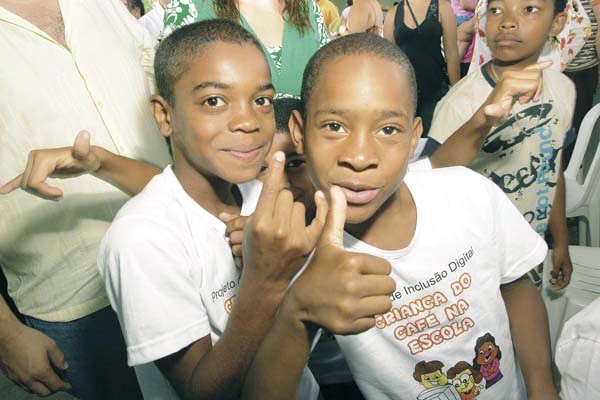 After 13 years of existence, the Program was audited and the internal process was concluded in 2016. This process aimed at verifying the condition of the digital laboratories of the Program Criança do Café na Escola
After 13 years of existence, the Program was audited and the internal process was concluded in 2016. This process aimed at verifying the condition of the digital laboratories of the Program Criança do Café na Escola
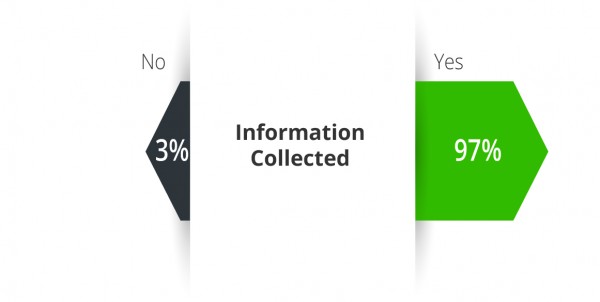
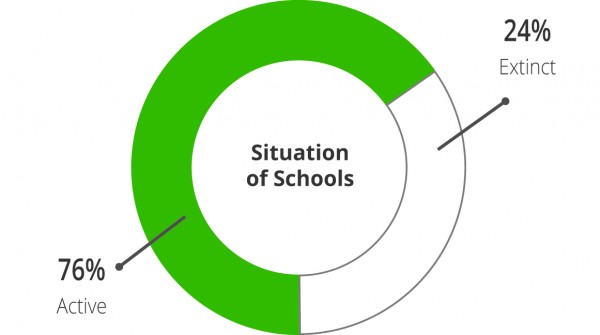
Considering the 102 active digital laboratories, the current conditions were evaluated to know the investment needs.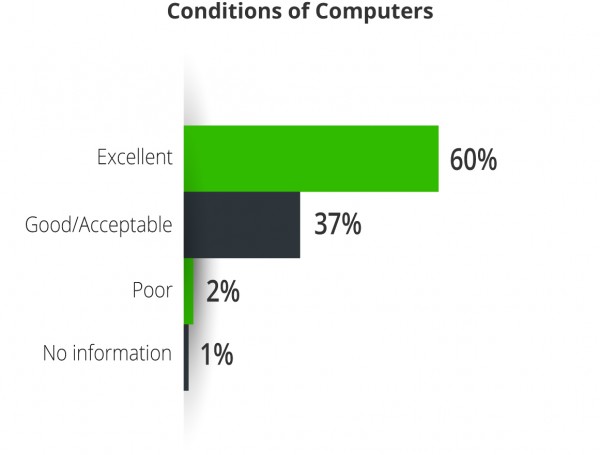 Excellent conditions: 60%, i.e., 61 laboratories with at least 8 operating computers; Good and acceptable conditions: 37%, i.e., 38 laboratories with 4 to 7 computers; Poor conditions: 2%, representing 2 laboratories with less than 4 computers.
Excellent conditions: 60%, i.e., 61 laboratories with at least 8 operating computers; Good and acceptable conditions: 37%, i.e., 38 laboratories with 4 to 7 computers; Poor conditions: 2%, representing 2 laboratories with less than 4 computers.
Digital coffee farmer
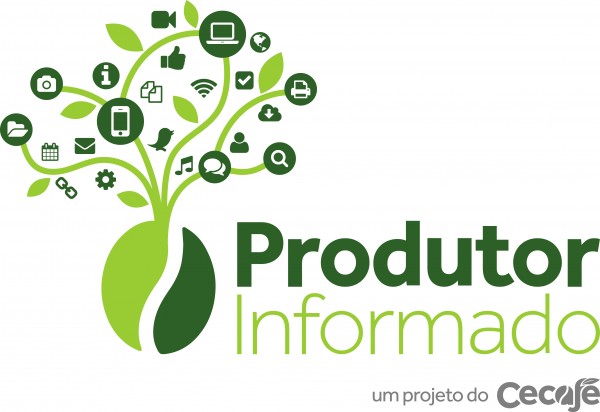 The Program Produtor Informado [Digital Coffee Farmer], created by Cecafé in 2006 to bring digital inclusion to rural regions, was significantly expanded in 2016. Through the beginning of the partnership with the Global Coffee Platform, in addition to digital inclusion, the Program started to disseminate sustainability in coffee production. Such content helps the adoption of good practices in productive systems and therefore, can increase business profitability and coffee quality, while ensuring environmental sustainability and improvement of life conditions for the rural population in general.
The Program Produtor Informado [Digital Coffee Farmer], created by Cecafé in 2006 to bring digital inclusion to rural regions, was significantly expanded in 2016. Through the beginning of the partnership with the Global Coffee Platform, in addition to digital inclusion, the Program started to disseminate sustainability in coffee production. Such content helps the adoption of good practices in productive systems and therefore, can increase business profitability and coffee quality, while ensuring environmental sustainability and improvement of life conditions for the rural population in general.
In addition to classes, several Field Days were promoted with the objective of showing, in practice, efforts to seek for the increasingly sustainable coffee production, with higher productivity and expansion of research application, technology and field improvements.
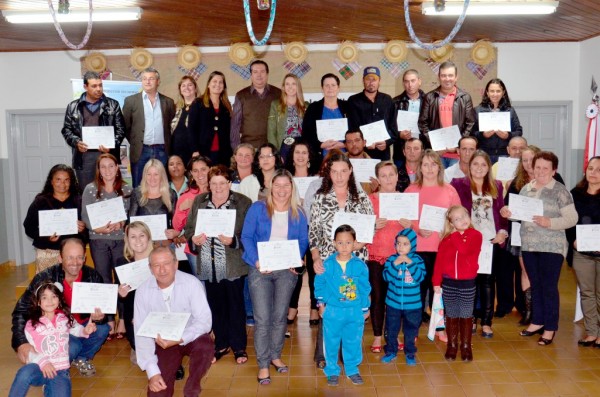 For that, Cecafé also established cooperation terms with extension entities, which provided agriculture technicians to teach classes. Currently, the Program counts on partnerships with Emater-State of Roraima, Emater-State of Minas Gerais, Fundação Hanns Neumann, Ifes-Agrifes, Via Verde, Cooabriel, Coocapec and Cooxupé, reaching 45 municipalities of the main producing states (Minas Gerais, Espírito Santo, São Paulo and Roraima).
For that, Cecafé also established cooperation terms with extension entities, which provided agriculture technicians to teach classes. Currently, the Program counts on partnerships with Emater-State of Roraima, Emater-State of Minas Gerais, Fundação Hanns Neumann, Ifes-Agrifes, Via Verde, Cooabriel, Coocapec and Cooxupé, reaching 45 municipalities of the main producing states (Minas Gerais, Espírito Santo, São Paulo and Roraima).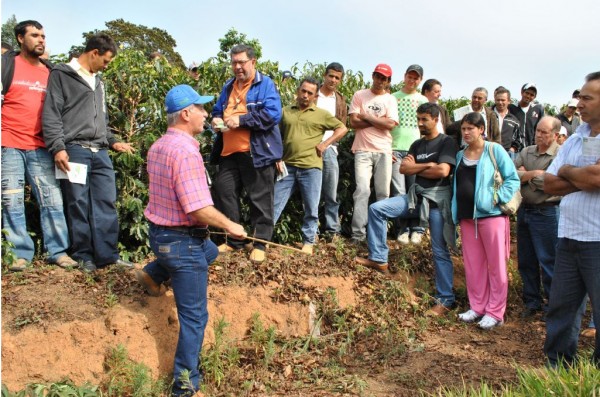
Thus, exceeding in 100% the goal established, there were 125 groups in 2016, training 1,500 rural producers, resulting in the qualification of more than 2,600 attendees since the creation of the Program in 2006.
Expectations for 2017: sustainable coffee hub
Based on the audit performed in the digital laboratories, the Deliberative Council of Cecafé has decided to renew and integrate the Programs, revitalizing digital laboratories in good, acceptable and poor conditions, which will integrate, as of 2017, the Polo Café Sustentável [Sustainable Coffee Hub], aims at strengthening Brazilian coffee production sustainability actions.
The Hub will represent the regional influence zone of sustainability actions, held, mostly, in the digital laboratories initially created for the Program Criança do Café na Escola [Coffee Kids at School]. It will be focused on people that interact with coffee production, such as:

According to the flowchart below, through partnerships and an information management system, the main Cecafé digital laboratories will be identified and transformed into hubs for implementing regionally integrated programs, also including teachers, young people and rural producers.
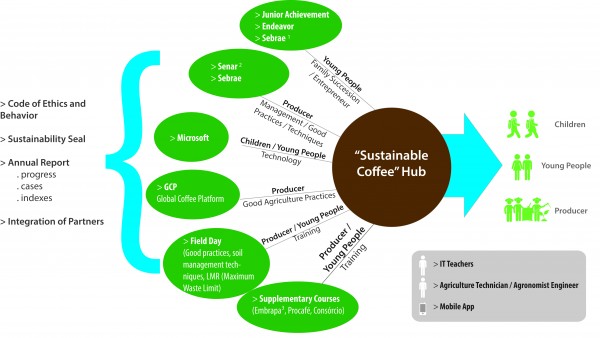
Teachers and students of the public system elementary schools
Children will be trained for digital inclusion, and will also have access to folders and playbooks on the importance of the rural producers and coffee for the region. This process aims at valuing the coffee image in order that children recognize the importance of coffee producers and this industry for Brazil. The intention is to implement everything through digital inclusion.
Teachers, the major information replicators, will be trained by e-learning, practical guides and sessions, with the objective of creating the cognitive and educational environment to form future citizens and qualified manpower for the fields. Quarterly lectures are planned with teachers of the main schools of the region, including a computer workshop for inclusion.
Young people in the rural environment
For young people, family succession and entrepreneurship topics are extremely important. According to Embrapa, Empresa Brasileira de Pesquisa Agropecuária [Brazilian Agricultural Research Corporation], by 2030, approximately 40% of the rural producers will leave the activity. Added to that, according to Sebrae, Serviço Brasileiro de Apoio às Micro e Pequenas Empresas [Brazilian Micro and Small Business Support Service], 70% of family companies end their activities due to the death of the founder and only 5% of the remaining ones survive to the 3rd generation.
Most of young people opt to leave the field to seek for better work conditions in large cities. Therefore, the challenge is to propose actions in order to make young people see opportunities in the field, with quality of life and income serving as encouragement to enable them to continue producing quality and sustainable coffee.
Rural Producers
Concerning rural producers, computer and sustainability classes, emphasizing good agriculture practices, will continue. However, a new module will be created, called Produtor Informado Avançado [Advanced Informed Producer], focused on producers that have already concluded the first phase. It is a demand identified directly by rural producers in several regions and this module will offer deep content on tools for field work and property management through the adoption of good agriculture practices and benchmarking for production costs.
As a result of all efforts for consolidating the sustainability in the Brazilian coffee production, Cecafé has improved the Code of Ethics and Behavior. This Code represents a solid incentive for an increasing amount of companies in the market to undertake efforts in the social and environmental fields and collaborate at making the entire community aware of the importance of sustainability in the coffee production chain.
The main principle is the observation of the provisions of the Code. 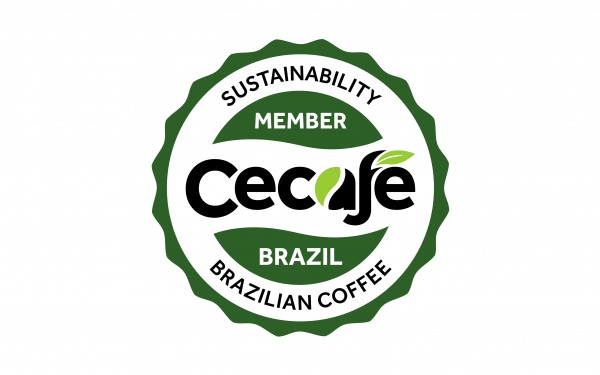 This way, the members associated to Cecafé seek for transferring to their supply chain the ethics and commitment with the national legislation. Thus, the Sustainability Cecafé Seal (image on the right) was created as a symbol to the initiative. The associated members may use the seal in different ways in their communications and products.
This way, the members associated to Cecafé seek for transferring to their supply chain the ethics and commitment with the national legislation. Thus, the Sustainability Cecafé Seal (image on the right) was created as a symbol to the initiative. The associated members may use the seal in different ways in their communications and products.
Final considerations
Although 2016 was challenging in many aspects, considering the context detailed above, we finished the year with clear commitment to the coffee production development. The expectation for 2017 is hope: the efforts of all coffee chain place us in the right path to ensure Brazil competitiveness and absolute leadership in the world coffee trade. During the new year ahead, we will act to leverage even more the sustainable coffee production in Brazil. Welcome 2017!
Marcos Matos – General Director of Cecafé


Leave A Comment